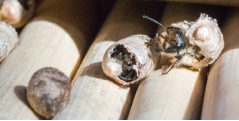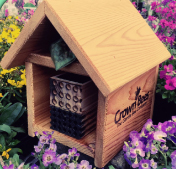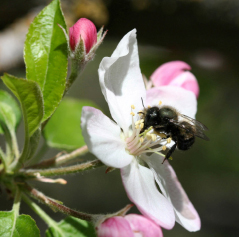by Alisha “Bee” Forrester Scott
It is our pleasure to present Part 2 of our wildlife series about bees and business. In our June issue, Part 1 highlighted the unique abilities of solitary bees, which are estimated to be 60 times more efficient at pollinating food crops than honey bees. These solitary-but-social bees forage separately, but some individuals sleep in the same location or share nests.
The article suggested that our farmed food supply chain would become more secure simply by giving the honey bees a rest and working primarily with solitary bees for pollination. Furthermore, two private businessmen were featured: Dave Hunter and Charlie Mohr. They are now teaching others how to “grow” solitary bee cocoons in organic crops and gardens.
Bee Math and Science
Pollination is the only way that nourishing foods like vegetables, fruits, nuts and spices exist. Bees are the top pollinators on the planet, for the food we eat and the food for our pets and livestock. If the worldwide bee colony collapse continues, what will happen to the honey bees? Until Mother Nature figures out the situation, we can keep our local food supply chains alive and growing by working with efficient pollinating solitary bees.
 By mathematical estimation and observable fact, many more bees of all types are necessary to fulfill our country’s food pollination needs and demands. The latest estimations determine that 1,000 solitary bees can do the work of 60,000 honey bees. Anyone who wants to can easily get involved in growing solitary bee cocoons. It is not expensive, and solitary bees are not prone to stinging.
By mathematical estimation and observable fact, many more bees of all types are necessary to fulfill our country’s food pollination needs and demands. The latest estimations determine that 1,000 solitary bees can do the work of 60,000 honey bees. Anyone who wants to can easily get involved in growing solitary bee cocoons. It is not expensive, and solitary bees are not prone to stinging.
 Among solitary bees, there are many different types with many different beneficial behaviors. The leafcutter bee is a very efficient pollinator, and the mason bee is an early spring pollinator that can operate at the lowest temperatures compared to any other insect.
Among solitary bees, there are many different types with many different beneficial behaviors. The leafcutter bee is a very efficient pollinator, and the mason bee is an early spring pollinator that can operate at the lowest temperatures compared to any other insect.
Charlie Mohr, creator of Bee With Me, is optimistic about the future of solitary bees. “Within three years, all our bee-growing work will pay off, as there will be up to 15 million various solitary bees to help pollinate the organic food supply,” he said. Garden centers will be carrying solitary bee- and honey bee-friendly equipment that Bee With Me is helping to organize and put together.
What about Bee-Friendly Standards?
In the U.S. each year, pollinated foods represent billions of dollars in profit. Pollinated food is a very big business. As you have likely noticed, food costs are rising. Whether food is in season or out of season, organic or not, it doesn’t seem to matter to the high cost of grocery store food.
 Mohr stated, “From ground studies, we see that solitary bees increase food supply production and increase profits to organic farms. We encourage commercial organic farms and home gardeners to switch from working with honey bees to growing solitary bees. Abusing honey bees happens simply to achieve pollination success, revenue or business growth. Solitary bees are the best option for organic farmers, because farms that are growing food will no longer have to rely on or abuse the honey bees. This standard of care is fair for the bees.”
Mohr stated, “From ground studies, we see that solitary bees increase food supply production and increase profits to organic farms. We encourage commercial organic farms and home gardeners to switch from working with honey bees to growing solitary bees. Abusing honey bees happens simply to achieve pollination success, revenue or business growth. Solitary bees are the best option for organic farmers, because farms that are growing food will no longer have to rely on or abuse the honey bees. This standard of care is fair for the bees.”
Thought you missed out on helping with the bee situation? Much of the work, public education, research, development and distribution is still in need of assistance. It takes only a few hours each year to grow solitary bee cocoons. Everyone can participate in re-establishing local and regional food supply chains. This is an exciting time!
Projects to watch for:
- Bee With Me is an organization where “prosumers” can find vital solitary bee growing information, as well as resources to acquire the basic equipment needed to get personally involved. Look for the hashtags #growbees and #beewithme.
- Bees News Network (BNN) is a “good news” network project that is being built to support the solitary bees industry news, and to inspire positive involvement moving forward. Bee With Me is sponsoring the alpha version of the BNN project as a public service.
- Look for more regular bee-related articles in Green Living magazine.
Alisha “Bee” Forrester Scott is an independent writer whose opinions do not necessarily represent the viewpoints of Green Living magazine or its affiliates. For more information on bees, e-mail alishabee@alishabee.com or visit alishabee.com.
Read more wildlife articles at greenlivingaz.com/wildlife







